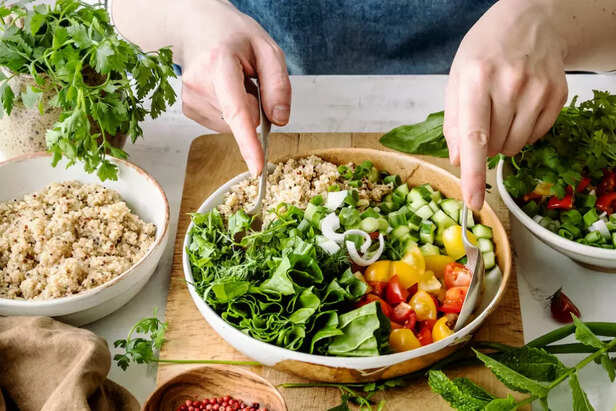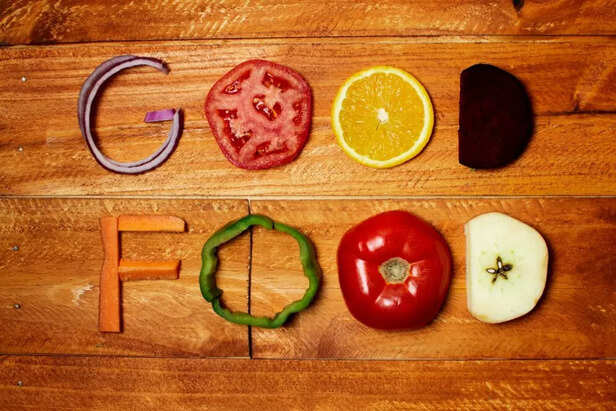Sick of Diets That Don’t Work? Try This for Real Weight Loss Results!
Shumaila Siddiqui | Wed, 30 Apr 2025
Struggling with ineffective diets? A vegan diet for weight loss or a vegetarian diet can help you shed pounds while boosting overall health. The benefits of a vegan diet include improved heart health, digestion, and energy. A structured vegan weight loss plan and vegetarian diet tips for weight loss, like avoiding processed foods and controlling portions, can lead to lasting results. Both vegan and vegetarian diets offer effective weight management solutions.

Photo:
In today's health-conscious world, where "clean eating" and "plant-based living" dominate social media and dinner table conversations, vegan and vegetarian diets have taken center stage. They're not just lifestyle choices anymore — they’re movements that promise a healthier body, a lighter conscience, and yes, easier weight loss. But is it really that simple? Can giving up meat and dairy actually help you shed pounds and boost your health? Let's dive deep into the facts, myths, and real benefits of going plant-based.

A vegan diet excludes all animal-derived products — no meat, no dairy, no eggs, and not even honey. This means relying entirely on plant-based foods such as fruits, vegetables, grains, legumes, nuts, and seeds.
So, how does going vegan help with weight loss?
Studies show that people on vegan diets tend to have lower body mass indexes (BMIs) than their meat-eating counterparts. But remember: simply avoiding animal products isn’t enough — eating processed vegan junk food won’t help your weight loss goals.
A vegetarian diet still avoids meat but often includes dairy and eggs. It offers more flexibility than a vegan diet and is generally easier for beginners to follow. Depending on the type, it can be:
For weight loss, a vegetarian diet can be highly effective when built around whole, unprocessed foods. However, it also comes with a few traps:
The key is balance — mixing fruits, veggies, legumes, healthy fats, and modest portions of dairy or eggs, while limiting processed snacks.

The benefits of a vegan diet go far beyond the waistline. Here’s how it boosts your overall health:
However, it’s essential to monitor nutrients like B12, iron, calcium, and omega-3s — commonly found in animal products — through fortified foods or supplements.

If you’re serious about losing weight on a vegan diet, you need more than just motivation — you need a solid plan. Here's a sample structure to get started:
Morning Routine
Breakfast Ideas
Mid-Morning Snack
Lunch Options
Afternoon Snack
Dinner Choices
Tips for Weekly Planning:

Losing weight as a vegetarian can be just as effective — if not more — when done correctly. Here are some essential tips:
With a smart mix of plant and animal-free foods, you can lose weight steadily without cutting corners or compromising on nutrition.

While vegan and vegetarian diets can be powerful tools for weight loss and overall wellness, they’re not automatically healthy or effective unless done right. Here are some common mistakes people make—and how to avoid them:
Just because a product is labeled “vegan” or “plant-based” doesn’t mean it’s healthy.
Going plant-based doesn’t mean skipping meals or drastically lowering calorie intake.
Protein is essential for fat loss, muscle repair, and satiety.
Without planning, it’s easy to fall back on unhealthy choices.
Plant-based diets are naturally high in fiber, which is great—but only if supported by water.
Whether you choose a vegan or vegetarian path, both diets offer sustainable, effective, and health-boosting routes to weight loss. The key is not about what you remove from your plate, but what you add — colorful vegetables, fiber-rich grains, lean plant proteins, and healthy fats. When combined with a mindful lifestyle, both diets can transform your energy, mood, and physical health. Remember, plant-based eating is not a short-term fix — it's a long-term commitment to your body and the planet.
Whether you’re new to these diets or a seasoned pro, we’d love to hear your experiences, tips, and questions! Share your thoughts in the comments below and let’s keep the conversation going—together, we can make plant-based living fun and sustainable.
Unlock insightful tips and inspiration on personal growth, productivity, and well-being. Stay motivated and updated with the latest at My Life XP.
Vegan Diet for Weight Loss

Plant Power
A vegan diet excludes all animal-derived products — no meat, no dairy, no eggs, and not even honey. This means relying entirely on plant-based foods such as fruits, vegetables, grains, legumes, nuts, and seeds.
So, how does going vegan help with weight loss?
- Lower Calorie Intake: Most plant-based foods are naturally lower in calories. Swapping cheese-laden meals for salads, legumes, and whole grains reduces overall calorie intake without leaving you hungry.
- More Fiber, More Fullness: Plant foods are rich in fiber, which promotes satiety. You feel full longer and eat less.
- Low in Saturated Fat: Eliminating meat and dairy cuts down on saturated fat, often linked to weight gain and heart issues.
- Improved Insulin Sensitivity: Vegan diets have been shown to regulate blood sugar levels, reducing fat storage and sugar cravings.
Vegetarian Diet
- Lacto-vegetarian: Includes dairy but not eggs or meat.
- Ovo-vegetarian: Includes eggs but no dairy or meat.
- Lacto-ovo vegetarian: Includes both eggs and dairy, but no meat.
- Dairy Overload: Full-fat cheese, creamy yogurt, and butter are calorie-dense and can slow down weight loss.
- Refined Carbs: Some vegetarians rely too much on white bread, pasta, and sugar — which leads to weight gain.
- Portion Size Misjudgment: Even healthy foods can add up if portions aren’t controlled.
Benefits of a Vegan Diet

Natural Energy
The benefits of a vegan diet go far beyond the waistline. Here’s how it boosts your overall health:
- Heart Health: Vegan diets reduce cholesterol and blood pressure, lowering the risk of heart disease.
- Better Digestion: High-fiber diets promote healthy bowel movements and reduce bloating.
- Lower Cancer Risk: Studies link plant-based diets with reduced risk of colon, breast, and prostate cancers.
- Clearer Skin: Removing dairy, which may trigger acne in some people, often results in healthier skin.
- Improved Energy Levels: A diet rich in fruits, vegetables, and whole grains provides lasting energy.
- Environmental Impact: Veganism reduces your carbon footprint, saving water, land, and energy.
Vegan Weight Loss Plan

Planned Progress
If you’re serious about losing weight on a vegan diet, you need more than just motivation — you need a solid plan. Here's a sample structure to get started:
Morning Routine
- Start your day with warm lemon water or green tea to boost metabolism.
- Do light stretching or a short walk to activate the body.
- Smoothie Bowl: Blend banana, spinach, berries, flaxseeds, and almond milk. Top with chia seeds and sliced almonds.
- Tofu Scramble with Veggies: A protein-packed alternative to scrambled eggs.
- Oatmeal with Fruits: Rolled oats topped with berries, nuts, and cinnamon.
- Hummus with cucumber and carrot sticks
- A small handful of mixed nuts
- Buddha Bowl: Quinoa, chickpeas, roasted sweet potatoes, kale, and tahini dressing.
- Lentil Soup with whole grain toast.
- Chickpea Salad Wrap: Mashed chickpeas, vegan mayo, lettuce, and tomatoes in a whole grain wrap.
- Roasted chickpeas
- Apple slices with peanut butter
- Stir-fried tofu with brown rice and vegetables
- Vegan chili with beans and avocado
- Zucchini noodles with tomato-basil sauce and nutritional yeast
- Prep meals in advance to avoid take-out temptations.
- Stick to whole, unprocessed plant foods.
- Drink at least 2–3 liters of water daily.
- Include 30–40 minutes of exercise 5 times a week.
- Get 7–8 hours of sleep — it aids fat loss and hormonal balance.
Vegetarian Diet Tips for Weight Loss

Smart Eating
Losing weight as a vegetarian can be just as effective — if not more — when done correctly. Here are some essential tips:
- Choose Low-Fat Dairy: Go for skim milk or plant-based alternatives.
- Go Egg-Smart: Eggs are a great protein source, but moderation is key.
- Watch the Cheese: It's calorie-dense — use sparingly or try vegan cheese alternatives.
- Incorporate Pulses: Lentils, beans, and chickpeas are high in protein and fiber.
- Mind the Carbs: Prefer brown rice, oats, and millets over white rice and refined flour.
- Snack Wisely: Air-popped popcorn, roasted seeds, or a handful of almonds are better than chips or cookies.
- Stay Active: Diet alone won't work without regular movement.
Common Mistakes to Avoid in Vegan and Vegetarian Diets for Weight Loss

Hidden Traps
While vegan and vegetarian diets can be powerful tools for weight loss and overall wellness, they’re not automatically healthy or effective unless done right. Here are some common mistakes people make—and how to avoid them:
1. Overloading on Processed Plant-Based Foods
- Problem: Vegan cookies, mock meats, chips, and sugary plant milks are often high in calories, oils, sodium, and added sugars.
- Solution: Focus on whole foods like legumes, whole grains, vegetables, fruits, seeds, and nuts. Use packaged vegan foods sparingly and always check ingredient labels.
2. Eating Too Few Calories or Nutrients
- Problem: Some people unintentionally eat too little, leading to fatigue, hair loss, low immunity, and nutritional deficiencies.
- Solution: Ensure your meals are balanced with carbs, proteins, and healthy fats. Add calorie-dense healthy options like avocado, nut butters, lentils, and quinoa.
3. Neglecting Protein Intake
- Problem: Many vegetarians and vegans don’t prioritize protein, leading to loss of muscle mass during weight loss.
- Solution: Include plant proteins like lentils, tofu, tempeh, chickpeas, green peas, soy milk, quinoa, and chia seeds. Aim for 0.8–1.2 grams of protein per kg of body weight, depending on activity level.
4. Skipping Meal Planning and Prep
- Problem: Lack of ready-to-eat healthy options can lead to frequent takeouts or snacking on junk.
- Solution: Meal prep for the week. Keep chopped veggies, cooked beans, or frozen fruits on hand. Prepare smoothie packs, stir-fry kits, and lentil soups in advance.
5. Not Drinking Enough Water or Fiber Mismanagement
- Problem: A sudden increase in fiber without enough hydration can cause bloating or constipation.
- Solution: Gradually increase fiber and drink 2–3 liters of water daily. Herbal teas and lemon water can also aid digestion.
Whether you’re new to these diets or a seasoned pro, we’d love to hear your experiences, tips, and questions! Share your thoughts in the comments below and let’s keep the conversation going—together, we can make plant-based living fun and sustainable.
Unlock insightful tips and inspiration on personal growth, productivity, and well-being. Stay motivated and updated with the latest at My Life XP.
Frequently Asked Question (FAQs)
- Do you lose more weight being vegan or vegetarian?
Weight loss depends on food choices, but a vegan diet may promote more weight loss due to fewer calorie-dense foods. - How to lose 5kg in 7 days diet vegetarian?
Rapid weight loss is not healthy, but a balanced, low-calorie vegetarian diet with portion control and exercise may help. - Which diet is healthier, vegan or vegetarian?
Both can be healthy if well-balanced, but a vegan diet tends to be lower in saturated fat and cholesterol.










